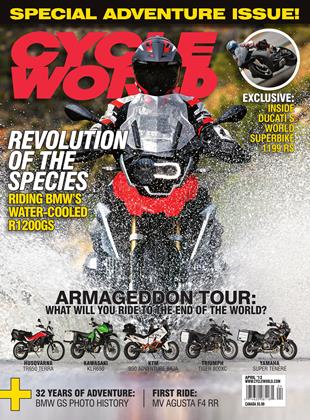Being Prepared
UP FRONT
MARK HOYER
I HAVE TWO ESSENTIAL MINDS IN LIFE. ONE is Mad Motorcyclist and the other is Firefighter EMT. Sometimes I struggle to know when I should be wearing which helmet.
Seven years ago, before joining the fire department as a volunteer, I was blissfully ignorant of the many ways we can get injured in this world—and not just from potential motorcycle crashes. It is just ridiculous how vulnerable we are, and the willful suspension of dire possibilities and “it won’t happen to me” are standard operating procedure for anybody who wants to live a life of action.
I often ponder the risk-vs.-reward equation that motorcycling and other perilous endeavors present (“Turning Cards,” Up Front, January).
But no amount of training or attempted mediation of risk makes it any easier to accept the passing of veteran motojournalist Kevin Ash. The Englishman died as a result of injuries in a crash at the 2013 BMW R1200GS press introduction in South Africa. I knew Kevin from the countless times I’d seen him on trips to ride new motorcycles around the world. He was an intelligent, witty man who, at 53, had countless miles of safe, professional riding behind him and a track record of great stories to prove it. He was husband and a father, his three daughters, by all reports, talented young women on their way to making great contributions to this world. Much like their father had been doing as the motorcycling correspondent for England’s The Daily Telegraph for the past 15 years, as well as contributing to many, many magazines around the planet.
He was a founding editorial member of Fast Bikes magazine and a former Motor Cycle News staffer, as well as the author of several books. Both the Telegraph and MCN have published wonderful tributes to the man. I knew him professionally, but not nearly well enough to do his memory justice, so I encourage you to look up the stories written by those who were closer to him.
What I’ve struggled with since that day is the way the events unfolded after the crash and my level of preparedness in dealing with the aftermath. I last saw Kevin alive at the intersection where we stopped before heading toward the Baviaanskloof, the final and hardest off-road section we were scheduled to encounter during that long day of riding in the hot African sun. As you can see from my self-portrait (bottom, right), there were a few small homesteads, but we were well off in the bush.
Our group of American riders waited for the dust to subside after the British contingent headed up the trail, and then followed them. After several miles, we pulled up behind one of the white BMW X6 crossovers that were being used by the photographers. Perhaps we were stopping for a photo shoot, I thought, because I had no idea of the circumstances just beyond the SUV In fact, it took precious minutes for me to realize there had been an accident and a few minutes more to grasp that it had been very serious. Even then,
I had no idea what I was walking into as I pulled off my helmet and approached the scene. I switched to EMT mode.
Shawn Thomas from RawHyde Adventures, another American with EMT training, was already at Kevin’s side. We were the first medically trained people to arrive, and I’d estimate we were 10 minutes behind the accident. It was clear after a quick assessment that we could not help Kevin, so we shifted our attention to the other patient involved in the crash. Thankfully, he’d suffered only a dislocated shoulder, but we looked for other injuries and monitored his condition until the medics arrived quite a long time later.
What I was reminded of by the incident is how in-the-middle-of-nowhere we can be pursuing our dream of freedom on two wheels, and how important it is to be prepared for any eventuality. Despite having good training, I felt helpless. I had no equipment, not even a pair of exam gloves. The situation didn’t ultimately require complex interventions like CPR, oxygen or bleeding control. But it really underlined to me, once again, how important it is to be prepared.
Although I was mentally equipped to do what was necessary that day, I am now putting together a first-aid kit to take along on group rides. I was not prepared enough, and I don’t want to feel that way again.
Sometimes nothing can be done, as we saw for one man on that sad day in South Africa. But when help can be administered, nothing beats good training. And wouldn’t you want those standing over you to have the skills and tools to make potentially life-saving interventions?
I’m up for recertification next month, and I plan to study extra hard. And one other thing: From now on, I’m wearing both helmets any time I ride. □
 View Full Issue
View Full Issue
More From This Issue
-
 Roundup
RoundupHeart of A Superbike, Soul of An Adventurer
APRIL 2013 By Blake Conner -
 Roundup
RoundupFrom the Saddle
APRIL 2013 By BC -
 Roundup
Roundup25 Years Ago April 1988
APRIL 2013 By Don Canet -
 Roundup
RoundupWill Elastomers Change Helmet Design?
APRIL 2013 By Andrew Bornhop -
 Departments
DepartmentsHotshots
APRIL 2013 -
 Leanings
LeaningsThe Spark of Life
APRIL 2013 By Peter Egan







